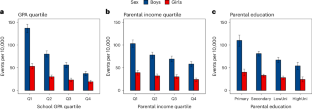挪威青少年死亡的学校成绩和社会梯度
IF 15.9
1区 心理学
Q1 MULTIDISCIPLINARY SCIENCES
引用次数: 0
摘要
来自低社会经济背景的年轻人面临着更高的早期死亡风险。在此,我们利用挪威17个出生队列(N = 986,573)的全人口数据,评估这种风险梯度是否可以用早年的教育表现(特别是16岁时的平均学分绩点)来解释。我们的研究表明,如果在模型中对学校成绩进行调整,父母教育程度和收入的梯度在很大程度上就会消失。具体来说,在男孩中,与父母教育程度最高的同龄人相比,父母教育程度最低的男孩的未调整危险比(HR)为 2.04(95% 置信区间(CI)为 1.86-2.22),而女孩的危险比为 1.64(95% 置信区间(CI)为 1.35-1.93)。在对学校成绩进行调整后,男孩的估计值降至 0.99(95% CI 0.79-1.19),女孩的估计值降至 0.87(95% CI 0.55-1.19)。同样,来自父母最低收入四分位数的男孩的死亡风险从 1.79(95% CI 1.67-1.91)降至 1.25(95% CI 1.12-1.38),女孩的死亡风险从 1.63(95% CI 1.44-1.83)降至 1.24(95% CI 1.03-1.46)。在考虑家庭层面未观察到的异质性的分析中,教育程度低仍与早期死亡密切相关;平均成绩处于最低四分位数的男孩的 HR 为 3.04(95% CI 2.38-3.89),而女孩的 HR 为 1.79(95% CI 1.22-2.63)。外部死因,尤其是意外事故和中毒,在学习成绩差的人中比例最高。本文章由计算机程序翻译,如有差异,请以英文原文为准。


School performance and the social gradient in young adult death in Norway
Young adults from low socioeconomic backgrounds face an increased risk of early mortality. Here we utilize population-wide data from 17 Norwegian birth cohorts (N = 986,573) to assess whether this risk gradient was explained by early-life educational performance, specifically grade point average at 16 years of age. We show that the gradients in both parental education and income largely disappeared when adjusting for school performance in the models. Specifically, among boys, those with the lowest parental education had an unadjusted hazard ratio (HR) of 2.04 (95% confidence interval (CI) 1.86–2.22) compared with peers with the highest parental education, while for girls, the HR was 1.64 (95% CI 1.35–1.93). After adjusting for school performance, these estimates dropped to 0.99 (95% CI 0.79–1.19) for boys and 0.87 (95% CI 0.55–1.19) for girls. Similarly, the mortality risk for those from the lowest parental income quartile decreased from 1.79 (95% CI 1.67–1.91) to 1.25 (95% CI 1.12–1.38) for boys and from 1.63 (95% CI 1.44–1.83) to 1.24 (95% CI 1.03–1.46) for girls. Low educational performance remained strongly associated with early mortality in analyses accounting for unobserved heterogeneity at the family level; boys with a grade point average in the lowest quartile had an HR of 3.04 (95% CI 2.38–3.89), while for girls, the HR was 1.79 (95% CI 1.22–2.63). External causes of death, particularly accidents and poisoning, were most overrepresented among individuals with poor school performance. This study, using population-wide data from Norway, found that school performance was a stronger predictor of young adult death than parental education or earnings and largely explained the socioeconomic gradient in early mortality.
求助全文
通过发布文献求助,成功后即可免费获取论文全文。
去求助
来源期刊

Nature Human Behaviour
Psychology-Social Psychology
CiteScore
36.80
自引率
1.00%
发文量
227
期刊介绍:
Nature Human Behaviour is a journal that focuses on publishing research of outstanding significance into any aspect of human behavior.The research can cover various areas such as psychological, biological, and social bases of human behavior.It also includes the study of origins, development, and disorders related to human behavior.The primary aim of the journal is to increase the visibility of research in the field and enhance its societal reach and impact.
 求助内容:
求助内容: 应助结果提醒方式:
应助结果提醒方式:


